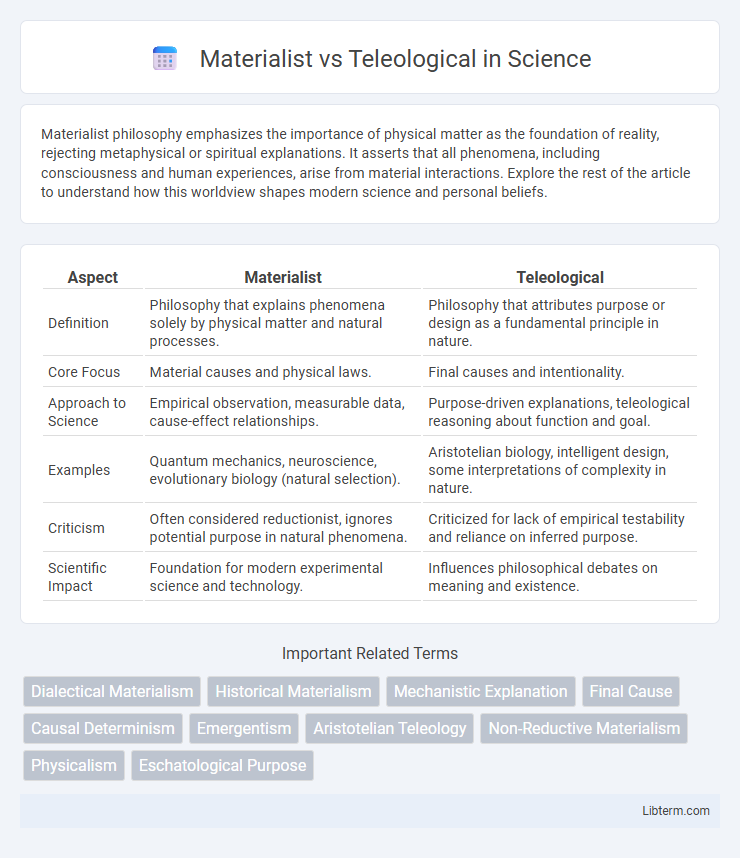Materialist philosophy emphasizes the importance of physical matter as the foundation of reality, rejecting metaphysical or spiritual explanations. It asserts that all phenomena, including consciousness and human experiences, arise from material interactions. Explore the rest of the article to understand how this worldview shapes modern science and personal beliefs.
Table of Comparison
| Aspect | Materialist | Teleological |
|---|---|---|
| Definition | Philosophy that explains phenomena solely by physical matter and natural processes. | Philosophy that attributes purpose or design as a fundamental principle in nature. |
| Core Focus | Material causes and physical laws. | Final causes and intentionality. |
| Approach to Science | Empirical observation, measurable data, cause-effect relationships. | Purpose-driven explanations, teleological reasoning about function and goal. |
| Examples | Quantum mechanics, neuroscience, evolutionary biology (natural selection). | Aristotelian biology, intelligent design, some interpretations of complexity in nature. |
| Criticism | Often considered reductionist, ignores potential purpose in natural phenomena. | Criticized for lack of empirical testability and reliance on inferred purpose. |
| Scientific Impact | Foundation for modern experimental science and technology. | Influences philosophical debates on meaning and existence. |
Introduction to Materialist and Teleological Worldviews
Materialist worldviews emphasize physical matter and natural processes as the fundamental basis of reality, asserting that everything can be explained through empirical observation and scientific inquiry. Teleological worldviews center on purpose and design, suggesting that the universe and life have inherent goals or ends that guide existence and development. These contrasting perspectives shape interpretations of existence, causality, and the nature of life across philosophy and science.
Historical Origins of Materialism
Materialism originated in ancient Greek philosophy, notably with thinkers like Democritus, who proposed that everything consists of atomic matter and natural causes rather than supernatural purposes. This view contrasted with teleological explanations, which attribute design and purpose to natural phenomena, rooted in Aristotle's philosophy emphasizing final causes. The historical shift towards materialism laid the groundwork for scientific inquiry by focusing on observable, physical substances as the basis of reality, rejecting metaphysical purposes or divine intentions.
Roots and Evolution of Teleological Thought
Teleological thought traces its roots to ancient Greek philosophy, notably Aristotle, who emphasized purpose and final causes as inherent to nature. This perspective evolved through medieval scholasticism, integrating theological insights that reinforced purposeful design in the natural world. The contrast with materialism arises from teleology's focus on intrinsic goals and functions, rather than purely physical or mechanistic explanations.
Key Philosophical Differences
Materialist philosophy asserts that physical matter is the fundamental substance in nature, emphasizing causality through material interactions and denying intrinsic purpose in natural processes. Teleological philosophy argues that natural phenomena are explained by purpose or goal-directedness, suggesting that entities and events inherently aim toward specific ends or functions. The key philosophical difference lies in materialism's rejection of inherent purpose, focusing on tangible causes, whereas teleology centers on final causes and purposiveness in explaining existence.
Materialist Explanations of Reality
Materialist explanations of reality assert that all phenomena arise from physical matter and its interactions, emphasizing empirical evidence and scientific observation. Reality is understood through the laws of physics, chemistry, and biology, where consciousness and mind emerge from material processes. This perspective rejects supernatural or purpose-driven causes, focusing instead on tangible, measurable entities and mechanisms.
Teleological Explanations of Purpose
Teleological explanations of purpose emphasize that phenomena and entities exist to fulfill specific ends or functions, highlighting intention and final causes as central to understanding reality. Unlike materialist views focusing solely on physical matter and processes, teleology interprets natural and human-made systems as goal-directed, where purpose drives development and behavior. This perspective is foundational in disciplines like biology, ethics, and philosophy, where it frames organisms, actions, and events as oriented toward intrinsic or extrinsic objectives.
Applications in Science and Nature
Materialist perspectives in science emphasize physical matter and measurable phenomena, driving research in fields like physics, chemistry, and biology through empirical experimentation and observation. Teleological approaches, focusing on purpose and design, inform studies in evolutionary biology and cognitive science by exploring functional adaptations and goal-directed behaviors in organisms. Combining both views fosters comprehensive understanding of natural processes, enhancing innovations in biotechnology and environmental science.
Influence on Ethics and Morality
Materialist ethics prioritize tangible outcomes and physical well-being, influencing moral frameworks that emphasize empirical evidence and practical consequences. Teleological ethics shape morality by focusing on purpose and desired ends, often grounding ethical decisions in broader goals like happiness or virtue. The contrast between these perspectives drives debates on whether ethical values are derived from material conditions or intrinsic purposes.
Modern Debates: Materialism vs. Teleology
Modern debates between materialism and teleology center on whether natural phenomena are best explained by physical processes alone or by purposeful ends. Materialists argue that all events result from matter and energy interactions without intrinsic purpose, emphasizing empirical evidence from neuroscience and physics. Teleologists contend that certain biological and cosmic features exhibit goal-directed complexity, suggesting an inherent purposiveness that materialist frameworks struggle to fully account for.
Implications for Future Philosophical Inquiry
Materialist perspectives, emphasizing physical processes and empirical evidence, guide future philosophical inquiry toward integrating neuroscience and quantum physics to explain consciousness and reality. Teleological frameworks, centered on purpose and inherent goals, encourage exploration into the nature of meaning and ethical dimensions within the evolving technological landscape. Balancing these approaches may yield a comprehensive philosophy that addresses both mechanistic explanations and existential questions in advancing human understanding.
Materialist Infographic

 libterm.com
libterm.com